by Isabella Maradiaga Molina | Jun 4, 2020 | Academics, College Decisions, Current Students, Faith Infusion, MAcc, Placement stories, Professional Development, Student Spotlights, Uncategorized
Student leaders across campus display ACU’s mission daily through their academic excellence, Christian service and leadership on our campus. Every year, students like these are nominated by their academic department and from those nominations, fifty scholars are selected by the ACU Faculty Senate to receive the University Scholars Award for their graduating class. Among these fifty scholars who demonstrated outstanding scholarship by maintaining a GPA of 3.5 or higher, earned 90 hours towards their degree, and pursued knowledge in their research field, are four students from the College of Business Administration. The students who received this year’s award are Allie Sorrells, Bryce Adams, Jessica Herrera and Luke Stevens.
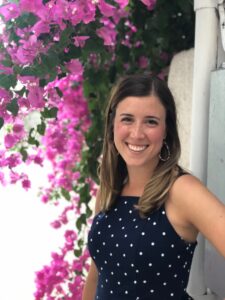
Allie Sorrells
Allie Sorrells is an accounting and management major from Waco, TX. During her time on campus, Allie enjoyed participating and creating long-lasting memories in ACU traditions like Sing Song, the Homecoming Parade, Freshman Follies, and Candlelight Devo. Allie has been an active member of the Honors College, Beta Gamma Sigma and the women’s social club Ko Jo Kai, where she served as treasurer this past academic year. Allie also served as project lead for the Enactus Children’s Business Fair through the Griggs Center for Entrepreneurship and Philanthropy. Among her favorite activities while at ACU was the opportunity to study abroad in Oxford with the College of Business Administration. While there, they visited the manufacturing plant of BMW and Porsche and participated in an extensive project with ASDA. “With ASDA, we analyzed the company’s business process at multiple locations and came up with our own solutions and improvements. We then shared these ideas with the corporate employees in a professional business presentation. Through that experience, we learned how to go about preparing for and giving formal presentations while incorporating what we were learning in class,” Sorrells stated. Allie commends her professors for bringing their industry expertise to the classroom, speaking from real-world experience and a place of faith, while preparing students to enter the world as ethical businessmen/women. With this faith and business incorporation in mind, Allie hopes to start graduate school, complete her CPA exams, and eventually work in corporate accounting or supply chain management. As she wraps up her time at ACU, Allie says, “I am very grateful for my time here at ACU and in COBA. It’s been a really special experience and I wouldn’t trade the past few years for the world. If you have not plugged in, find an organization in COBA, at ACU, or in the general community to become a part of. Also, get to know your professors; they can become some of your biggest advocates and supporters.”

Bryce Adams
Bryce Adams is a financial management major from Dallas, TX. Coming from a family of ACU Wildcats, Bryce was drawn to the academic excellence that this university strives. “The quality of ACU’s business school really sealed the deal for me,” Adams said. As a student at the College of Business Administration, Bryce has enjoyed opportunities like Leadership Summit, a week-long course in January where his perspective on life and business was transformed. Additionally, the advice and guidance of business alumni who visited the ACU campus have served as motivation for Bryce. “I think COBA has instilled values that are nestled within the education that are more important than the actual education. You can get an education anywhere; COBA certainly educates you but, if you let it, it will give you principles that serve you for life beyond business,” Bryce added. Besides being involved in his department as a member of Heacock Scholars, he serves as an Apartment Leader for World’s Backyard, where he seeks to share the Gospel while growing in relationship with the kids he serves and creating a long-lasting impact in their lives. As someone who has decided to give full control to the Lord, Bryce says, “Anything I’ve achieved is through God’s grace and provision. He deserves the accolades, not me. If you have any business ideas you’re thinking about or you just want to talk about the Lord, let’s grab coffee.”

Jessica Herrera
Jessica Herrera is an accounting major with a minor in mathematics from Schertz, TX. After pursuing her dream of receiving an education that incorporated Christianity, she arrived at ACU where she was immediately impacted by prayers and scripture readings by her professors during class sessions. Her involvement on campus includes being a member of the women’s social club Delta Theta and W-Club, a group of women joined by academic excellence. After taking advantage of professional development opportunities such as “Meet the Firm Night”, a networking event with different accounting firms, she is planning on enrolling in the MAcc program with hopes to land a job in one of the Big 4 accounting firms. She attributes her preparedness for the future to those professors who have invested in her education and the professional development that guided her career aspirations for the future. “ACU is such a great school and I feel that I have grown exponentially in my faith and education in the few years that I have been here. I have had a great college experience by taking advantage of the many opportunities and activities that ACU has available to its students,” Jessica shared.

Luke Stevens
Luke Stevens is a marketing major from Montgomery, TX. Luke came to ACU seeking a high-quality education that was accompanied by a Christian foundation, “ I didn’t want to compromise on my conviction to be educated in this way and ACU offered the perfect opportunity to pursue my desire for a Christian education,” Stevens said. During his time at ACU, Luke participated as Junior Class Treasurer for the Student Government Association, worked for the College of Business Administration as a student worker and served as project lead for the Enactus Brainstorming Committee. Besides his involvement with student organizations, Luke was able to attend Leadership Summit and feel the support of faculty and staff in his department who helped him advance his career opportunities. When asked what his favorite thing about his time at ACU was, Luke said, “My favorite thing about COBA is the relationships I made there. I have made lifelong friends with fellow business students and will always be grateful for their influence on my education and spiritual growth. The faculty and staff are simply exceptional. They care about quality education, exemplify ethical leadership, and have a sincere desire to see you succeed. I certainly consider several of the faculty and staff at COBA to be my mentors and friends.” Luke is planning to attend Southern Methodist University in the fall to complete a Master of Science in Business Analytics in the fall. As he leaves ACU until his next visit, Luke says, “My time as a business student at ACU has changed my life in drastic ways. Some people might pass through college and 10 years later not be able recall what they learned or people they met. For me, I know I will never forget the family I became a part of at ACU and what they taught me.”
by Katherine Norris | May 28, 2020 | Academics, COBA Faculty, Research, Uncategorized
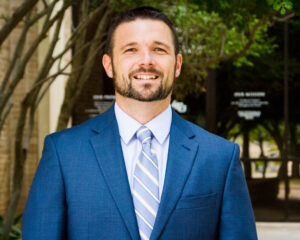 COBA professors have been in a researching groove lately (as Don Pope would say, “They must be butter; they’re on a roll.”). We have seen professors such as Dr. Monty Lynn, Dr. Ryan Jessup, and now Dr. Dennis Marquardt, continue to conduct important research and have their work published in industry journals. Dennis Marquardt recently wrote a paper entitled: “Leader Goal Orientation and Ethical Leadership: A Socio-Cognitive Approach of the Impact of Leader Goal-Oriented Behavior on Employee Unethical Behavior.” The paper was written with co-authors Dr. Wendy Casper at UT-Arlington and Dr. Maribeth Kuenzi at SMU.
COBA professors have been in a researching groove lately (as Don Pope would say, “They must be butter; they’re on a roll.”). We have seen professors such as Dr. Monty Lynn, Dr. Ryan Jessup, and now Dr. Dennis Marquardt, continue to conduct important research and have their work published in industry journals. Dennis Marquardt recently wrote a paper entitled: “Leader Goal Orientation and Ethical Leadership: A Socio-Cognitive Approach of the Impact of Leader Goal-Oriented Behavior on Employee Unethical Behavior.” The paper was written with co-authors Dr. Wendy Casper at UT-Arlington and Dr. Maribeth Kuenzi at SMU.
We asked Dr. Marquardt where his motivation and inspiration to work on this research came from. “For the past decade, I’ve been fascinated by the idea of ‘unintended consequences,’ specifically as this applies to leader/follower dyads. In other words, are there attitudes or behaviors that managers engage in that don’t necessarily seem unethical, but may have the consequence of unknowingly encouraging unethical behavior among employees.”

Photo by Jeremy Enlow
Dr. Marquardt summarized the concepts in the research and what type of consequences can come from such situations saying, “In this paper, we propose that leaders with high levels of a performance-avoid goal orientation are perceived to be less ethical and in turn, encourage employees to engage in unethical behaviors. Performance-avoid goal orientation refers to the extent to which a person approaches tasks or goals with a desire to not look incompetent compared to their peers. When a leader has such an orientation they are likely to send cues and signals to employees that making mistakes is to be avoided at all costs, that having the appearance of incompetence is unacceptable, or that making the leader look bad is a cardinal sin.”
He continued, “These cues and signals don’t seem unethical on their own, but imagine what they might do to employees over time. If I’m constantly hearing about avoiding mistakes and failures and trying to not look incompetent, what do I do when I actually do make a mistake? We propose that you might have a higher propensity to consider covering things up, blaming others, or lying about your performance. Our study analyzing several hundred leader/follower dyads found that leaders with high levels of avoid-goal orientation have significantly lower levels of ethical leadership (as perceived by their followers) and have employees who are more likely to engage in unethical behavior. Only when leaders also had a high learning goal orientation did the effects of avoid goal orientation become non-significant.”

Photo by Jeremy Enlow
Having this paper published is definitely a feeling of joy and accomplishment for Marquardt. “This paper has been in the works since 2014 and out of all my published papers, it’s the one I’m most proud of. God is good! There are many times I was going to give up on it because it took so many hours of work over these past six years. I’m thankful for great co-authors who are people I respect and people who have modeled a learning goal orientation for me.”
Dr. Marquardt’s paper “Leader Goal Orientation and Ethical Leadership: A Socio-Cognitive Approach of the Impact of Leader Goal-Oriented Behavior on Employee Unethical Behavior.” was published in the Journal of Business Ethics this May and is available for reading by clicking here.
by Isabella Maradiaga Molina | May 21, 2020 | Academics, Alumni Spotlight, COBA Faculty, Marketing, Research, School of Information Technology and Computing, Uncategorized
Have you ever struggled to make a decision when given too many options? Choice overload, or overchoice, is a cognitive process where people have difficulty making a decision due to a variety of options. Why does this happen?
As part of the lifelong relationship vision of the College of Business Administration, Associate Professor of Marketing, Dr. Ryan Jessup, and SITC Director and Professor of Computer Science, Dr. John Homer, partnered with ACU alum, Levi Ritchie (’15), to research the choice overload effect. Their paper, “Hurry up and decide: Empirical tests of the choice overload effect using cognitive process models”, was featured in the American Psychology Association’s April issue on decision. According to Scimago Journal & Country Rank, this journal is in the top 10% in psychology, neuropsychology and physical psychology subfield.
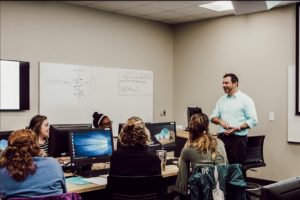
Dr. Ryan Jessup
While in graduate school at Indiana University, Dr. Ryan Jessup collected data to study a theory of decision making that prompted him to conduct this research as a follow-up from that work. As the lead author, Dr. Jessup generated the research idea and designed the experiment which was programmed by Dr. Homer. Levi Ritchie helped program part of the experiment in Python, recruited participants, and collected data before analyzing the data along with Dr. Jessup. The team combined their expertise in their respective fields to compile and edit the paper that was then published in the APA Journal. Dr. Jessup described the goal of their research as, “We wanted to test between multiple competing hypotheses that I had proposed in an earlier paper for the choice overload aka too much choice effect. The effect is that people purchase more when they have fewer options to choose from, violating basic economic principles.”

Levi Ritchie (’15)
The science of cognitive psychology is broad and contains a variety of potential research studies; however, Levi Ritchie described the importance of studying the choice overload effect as essential to the business field, “From a business perspective, understanding the elements that moderate the effect is crucial to marketing. Even when your selection of alternatives is plentiful, it may be beneficial to only present the strongest subset.” Similarly, Dr. Jessup commented on how important the understanding of this effect is when selling or promoting a product, as well as for personal decision making.
“An interesting thing about conducting quality research is that it makes us better at teaching. In my case, it is particularly true because I tend to teach courses on how to conduct or analyze research. But, even if I were teaching a different type of course it would still improve my teaching for several reasons. First, when teaching on a relevant topic, I would be far more aware of the pioneering research – in some cases because I would have been the one to do it; in other cases, it would be because I had to examine all possible theories and explanations when conducting my research, simultaneously giving far more breadth and depth than I would have gotten had I just read about it in the textbook or merely just read a few things about it. In essence, researchers know more about these findings because they are the ones making them – we are not merely reading about them. It is the ultimate in experiential learning”, Jessup said.
The conclusion of this research was explained in-depth in their publication, but Jessup summarized by saying, “We found that one of our proposed explanations well predicted the data whereas another one – the one that is commonly espoused as causing the effect – did not appear to play a role. A specific conclusion was time pressure appears to really drive the effect; so, if you are trying to sell things to people who are often hurried – think drive-thru’s or situations where people often have little children with them – you are better off giving them a very small set of options.”
Levi Ritchie is currently pursuing a career in Data Science, while Dr. Jessup continues to work on research on an improved theory of decision making that combines choice with learning. He is currently working on another project that involves the choices of married individuals and economic games with professors Katie Wick, John Homer and, recently graduated marketing major, Luke Stevens (’20).
by Katherine Norris | May 14, 2020 | Academics, COBA Faculty, Faith Infusion, Outcomes, Poverty and Development, Research, Uncategorized
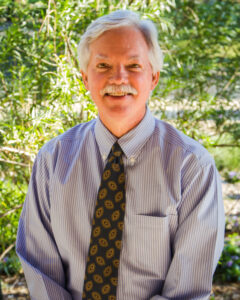 Do you ever wonder what COBA professors do when they aren’t teaching class? You may not know it, but many of our professors commit their time to conducting research of all different types. Dr. Monty Lynn recently co-authored a research article titled, “Better Together: Improving Food Security and Nutrition by Linking Market and Food Systems”. The article is a literature review of market and food systems informing on the latest impacts of COVID-19 towards global food security.
Do you ever wonder what COBA professors do when they aren’t teaching class? You may not know it, but many of our professors commit their time to conducting research of all different types. Dr. Monty Lynn recently co-authored a research article titled, “Better Together: Improving Food Security and Nutrition by Linking Market and Food Systems”. The article is a literature review of market and food systems informing on the latest impacts of COVID-19 towards global food security.
Dr. Lynn says, “The article is the fruit of a collaborative effort with technical advisors at World Vision and CARE, supplemented by faculty members at ACU and the Catholic University of America. To share the findings, the article authors will host a webinar in June to describe our work, mostly with a global CARE and World Vision audience. In the article, we combine two popular approaches in global food security which attempt to strengthen markets and nutrition, and we describe CARE and World Vision food security programming that illustrates the model. In the webinar, we will describe the latest information from CARE and World Vision on how the coronavirus pandemic and COVID-19 are impacting global food security.” Dr. Lynn notes that “It is a welcome and special opportunity to join a research team with two of the largest development organizations in the United States and to collaborate with my colleague, Dan Norell, a Senior Technical Advisor in Economic Development at World Vision in Washington, D.C.”
The article and webinar will explore the following:
- The Inclusive Market and Food Systems Model
- The importance of bringing the market to vulnerable households
- How empowering women multiplies nutritional outcomes
- How access does not necessarily equal consumption
- The impact of COVID-19 on programming and adaptive management for livelihood programs
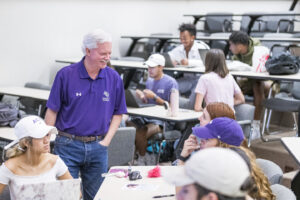
Photo by Jeremy Enlow
International development is a topic that Dr. Lynn stays current with for his research and an International Development class that he occasionally teaches at ACU. His recent research shows that “Major gains have been made in global food security, reducing global hunger. Gains began eroding in 2015, however, and global food insecurity began rising again. Nearly one billion people are food insecure today and 140 million of those became food insecure because of the impact of the coronavirus pandemic and mitigation efforts that have disrupted food production and supply chains.”
This blog post is just a glimpse of the information that is covered in the research article. We encourage you to read the full article HERE and join the webinar on May 19th at 12:30 pm EST, Washington, D.C. time zone HERE.
by M. C. Jennings | May 7, 2020 | Academics, COBA Faculty, Current Students, Financial Management, Student Trading and Research (STAR), Uncategorized
Since its inception in 1999 with an initial amount of approximately $100,000, STAR has had several goals in mind. One of those goals was reached when the group hit a huge milestone with $1.5 million in their portfolio this past spring although the portfolio has dipped slightly with the recent economic crisis due to the COVID-19 pandemic. Another one of those goals was reached today when the group was able to make their first distribution from earnings.
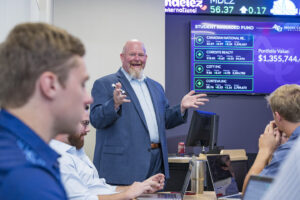
Photo by Jeremy Enlow
Assistant Professor of Finance Dr. Jody Jones, said that the distribution will be “$63,000, roughly 4.5% of the December 31, 2019 balance. Students ‘final’ this Thursday is to make sure they have the cash to distribute back to the endowment. The cash for this disbursement came primarily from gains made this semester on Ford (F), Gold (GLD), and decreasing the holdings in Healthcare Inc (HCA). As of this writing, the fund is $1.3 million (almost to the penny) and STAR is beating the S&P 500 by almost 5% YTD.”
STAR is a student-managed equity fund that is part of the university’s endowment. This semester the students must have $63,000 (4.5% of the 12/31 value) in cash. That money will be used to support the operation of the university as a whole. Jones says that students gain experience that will career over into their professional careers in the future. “Managing over $1 million dollars is something they can put on their resume and shows they have experience – especially this semester when many students lost jobs and internship opportunities.”
Senior Finance major Hunter Jennings said that he learned many things from his time in STAR. “I learned that in order to learn and be successful, you have to be willing to take risks. This experience will translate into my professional career because it pushed me to make decisions and effectively communicate my thoughts and ideas with my peers.”
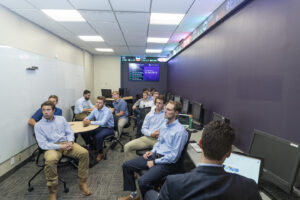
Photo by Jeremy Enlow
As for learning during a time when the stock market was particularly volatile, Jennings said, “The stock market can be rewarding and it can hurt you. It is all about how you react to those changes. There was a point where we had the fund to its highest value, just to have the market crash and the value go back to where we started.”
Hunter encourages students to consider being a part of the group. “I think that if anyone is interested in getting to work with a team and see real-world results, then they should join STAR. You don’t have to have any experience trading stocks or even be a finance major. Overall, it was one of my favorite classes to take at ACU.”
by Katherine Norris | Apr 9, 2020 | Academics, Careers In..., City of Abilene, Current Students, Student Spotlights, Uncategorized
 Graham Cepica (’21) is a marketing major from Lubbock, TX. Graham recently began an internship with New York real estate developer, Horacio LeDon, where he has been able to receive real-world experience that he can translate to the classroom and his professional career development. When it comes to internships and job searches, networking often plays a vital role in finding the opportunities that will provide the most valuable experience. Initiative, interest, and passion also play a large role in obtaining such opportunities. Graham is a wonderful example of how networking brought him to a once in a lifetime internship opening.
Graham Cepica (’21) is a marketing major from Lubbock, TX. Graham recently began an internship with New York real estate developer, Horacio LeDon, where he has been able to receive real-world experience that he can translate to the classroom and his professional career development. When it comes to internships and job searches, networking often plays a vital role in finding the opportunities that will provide the most valuable experience. Initiative, interest, and passion also play a large role in obtaining such opportunities. Graham is a wonderful example of how networking brought him to a once in a lifetime internship opening.
“Last semester, I had the chance to attend the Abilene Young Professionals Summit. In one of the breakout sessions, a local entrepreneur and real estate developer named Tim Smith was speaking. After the panel, I introduced myself to him and got his information. It wasn’t long before I was spending my days downtown shadowing Tim, meeting people, and learning about the exciting developments in store for Abilene. Towards the end of the semester, I approached Tim about a possible internship for the coming spring. Even though he could use a hand with his projects in south downtown, he suggested a better alternative. Tim introduced me to a man by the name of Horacio LeDon, a prominent real estate developer from New York that was a fellow investor in the purchase of the Windsor Hotel. Horacio was the lead developer for the renovation and revitalization of the historic building and was willing to take me on as his intern. Tim recognized that this project would be a once-in-a-lifetime opportunity for me, and the experience has been nothing short of exactly that.”
“I would go to my internship every weekday after I got out of class. A typical day looks like me meeting Horacio after lunch and updating him on any upcoming meetings that I have set up for us with different vendors and partners. For example, Abilene companies that sell flags that we want to extend from the balcony, potential businesses that we are interested in for the retail spaces connected to the lobby, interviews with local CPA’s to serve as part-time CFO’s, interior designers that can come alongside us in the project, architects, lighting designers, security services, etc. In addition to meetings, I organize floorplans, inspiration, official documents, and agendas into their corresponding files. Horacio and I have various shared photo albums with inspiration for the Windsor, as well as shared Notes with to-do lists. Sometimes, Horacio has his own meetings that I get to shadow. I have gotten to meet the city manager, chairman of the city council, and others by way of Horacio’s network. Horacio is always mindful of providing me with valuable experience and learning opportunities. The relationship I have with Horacio has been my favorite part of the internship. Due to a mutual respect for one another, we have developed an efficient working environment allowing me to serve the team and be part of a special development for downtown Abilene.”
This project has fueled a desire in Graham to further explore careers in real estate and real estate development. “I am intrigued by the creativity that real estate development presents. The ability to see something with potential and add value to it is something that I have a passion for. I would love to bring this passion into my career – whether I am adding value to a building, a project, or a team of people. But right now, my next best step is to ‘add value’ to this internship with the service I provide.”
The College of Business Administration seeks to provide all students with internship and job search help, professional development coaching, as well as helping students expand their professional network. Graham Cepica is definitely a testament to the power of networking, saying, “The networking opportunities at ACU had a domino effect that led me from one person to the next.”
Interested in learning more about professional development at ACU? Click here to learn more about the Professional Development program offered by COBA. Click here to learn more about ACU’s Career Center.




 COBA professors have been in a researching groove lately (as Don Pope would say, “They must be butter; they’re on a roll.”). We have seen professors such as Dr. Monty Lynn, Dr. Ryan Jessup, and now Dr. Dennis Marquardt, continue to conduct important research and have their work published in industry journals. Dennis Marquardt recently wrote a paper entitled:
COBA professors have been in a researching groove lately (as Don Pope would say, “They must be butter; they’re on a roll.”). We have seen professors such as Dr. Monty Lynn, Dr. Ryan Jessup, and now Dr. Dennis Marquardt, continue to conduct important research and have their work published in industry journals. Dennis Marquardt recently wrote a paper entitled: 



 Do you ever wonder what COBA professors do when they aren’t teaching class? You may not know it, but many of our professors commit their time to conducting research of all different types. Dr. Monty Lynn recently co-authored a research article titled, “Better Together: Improving Food Security and Nutrition by Linking Market and Food Systems”. The article is a literature review of market and food systems informing on the latest impacts of COVID-19 towards global food security.
Do you ever wonder what COBA professors do when they aren’t teaching class? You may not know it, but many of our professors commit their time to conducting research of all different types. Dr. Monty Lynn recently co-authored a research article titled, “Better Together: Improving Food Security and Nutrition by Linking Market and Food Systems”. The article is a literature review of market and food systems informing on the latest impacts of COVID-19 towards global food security.



